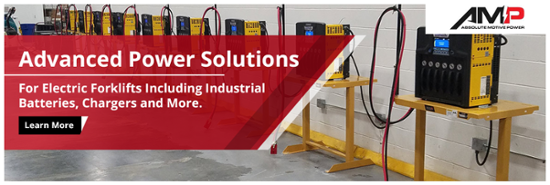The proper safe handling of lithium-ion batteries cannot be understated. Though these batteries are a common feature of our modern world - they power everything from laptop computers to power tools and modern appliances - they carry the potential for danger if handled improperly.
Lithium-ion batteries have earned their popular status due to their ability to store copious amounts of energy compared to alternatives. However, they’ve also earned their dangerous reputation due to their tendency to cause fires and explosions. By understanding how to safely store lithium-ion batteries, warehouses can utilize their numerous benefits while avoiding any of the hazards.
What is a Lithium-Ion Battery?
Also known as Li-ion batteries, lithium-ion batteries are a type of rechargeable battery used especially in warehouses for electric vehicles.
Lithium-ion batteries are popular choices for warehouses due to their performance and reliability. Their popularity stems from their ability to store larger amounts of energy in a single, compact battery - unlike conventional batteries. For operators looking for both a powerful and prolonged life span out of one charge, lithium-ion batteries have no match.
Looking for a new lithium-ion battery? REQUEST A QUOTE TODAY:
Top Benefits of Using Lithium-Ion Batteries
Warehouse managers in the material handling equipment industry may wonder if industrial grade lithium-ion batteries will become the standard, as opposed to lead-acid batteries. It’s understandable to see why; lithium-ion batteries have plenty of benefits.
Faster Charge
Lithium-ion batteries charge faster than traditional batteries, which allows for less downtime charging and more time operating electric forklifts. They have a longer battery life as well, allowing them to deliver more power.
Cleaner Charge
Hydrogen gas is generated as a byproduct when recharging conventional industrial batteries, which is toxic. Lithium-ion batteries emit less potentially harmful gases while charging.
Greater Capacity
When compared with lead-acid batteries, lithium-ion batteries carry a significantly greater energy density. This allows more energy to be stored in a lithium-ion battery using the same amount of physical space.
Lightweight
Lithium-ion batteries weigh many times less than traditional lead-acid batteries. Their lightweight nature is why lithium-ion batteries are used across industries, from laptop computers to other consumer electronics.
However, this same feature can also lead to problems integrating lithium-ion batteries into traditional counterbalanced forklift fleets currently powered by lead-acid batteries.
Lithium Battery Safety Precautions
While lithium-ion batteries feature plenty of benefits, they come with a handful of hazards. Lithium battery safety precautions should be taken seriously since mishandling of batteries can lead to an increased risk of fire and explosion.
Concerns About Weight
As mentioned before, the light weight of lithium-ion batteries can be both an advantage and a safety hazard. Preventing tip overs with electric equipment is a huge safety initiative in the material handling industry. Due to how lightweight a lithium-ion battery is compared to a lead-acid battery, there is an increased risk of counterbalanced forklifts tipping over due to the insufficient ballast.
A counterbalanced lift truck specifically designed for lithium-ion batteries would require thousands of pounds of useless ballast. Adding dead weight is not a cost effective or environmentally friendly solution.
Lithium-Ion Battery Explosion Hazards
The advantage of containing a very high energy density also comes with the risk of explosions and fires. Lithium-ion batteries can become unstable and explode under high temperatures, or even spontaneously ignite and cause fires.
The hazard is related to the way the battery is designed. Lithium-ion batteries consist of dozens of layers of coated metal foils separated by wafer-thin protective layers. Any cracks in these protective layers and the high density energy can be released, causing a fire.
Battery defects can result in the battery burning through these layers, possibly resulting in an explosion. Toxic gases released during battery fires can also be lethal to employees and firefighters attempting to stop the blaze.
How Fireproof Containers Make it Possible to Safely Transport Lithium-Ion Batteries
By adopting strict lithium battery safety precautions, the risk of a battery explosion or fire is significantly reduced. Preventative measures include maintaining compliance with manufacturer specifications, exclusive storage of batteries, and fireproof containers, among others.
UNCOVER HOW PREVENTATIVE BATTERY MAINTENANCE CAN REDUCE SAFETY RISKS IN YOUR FACILITY:
Storing and charging lithium-ion batteries in fire-resistant containers can help prevent catastrophic situations. These containers are specifically designed to safely store and charge batteries, minimizing the risk of fire and explosions and helping to avoid any damage to property and life.
If in case of a battery fire, many fireproof containers can protect the lithium-ion batteries inside from overheating for a period of 90 minutes. This prevents further lithium-ion battery explosions due to spontaneous ignition from the surrounding heat. If the fire occurs from a battery within the cabinet, most models can demonstrate fire resistance for a 90 minute period as well. Some fireproof container models are additionally equipped with automatic aerosol fire-extinguishing systems and smoke sensors for increased monitoring capabilities.
Experience Better Battery Safety with SSE!
Warehouses who choose to operate on lithium-ion battery systems need to take the extra safety initiatives that go hand in hand with the risks associated with these batteries. If your warehouse already has lithium-ion batteries, or is considering adopting them, it’s important to speak with an industrial battery expert.
At SSE, we are experts in battery handling technologies. With batteries, chargers, parts, accessories and systems installations, we make sure you talk with a Southern States Motive Power battery expert if you are in the market for traditional lead-acid batteries, lithium-ion batteries and battery handling charging systems to power your business forward safely.








